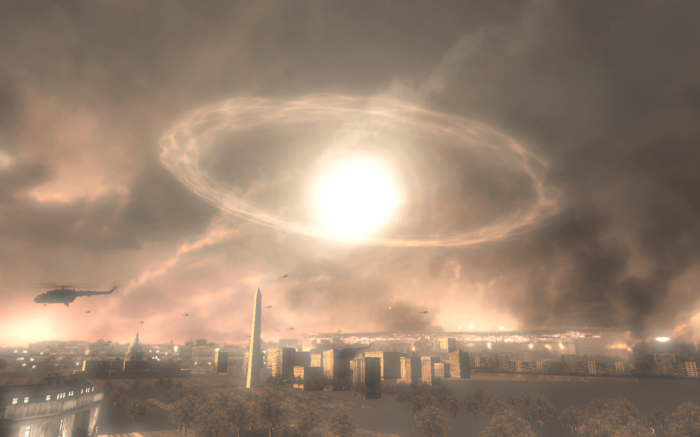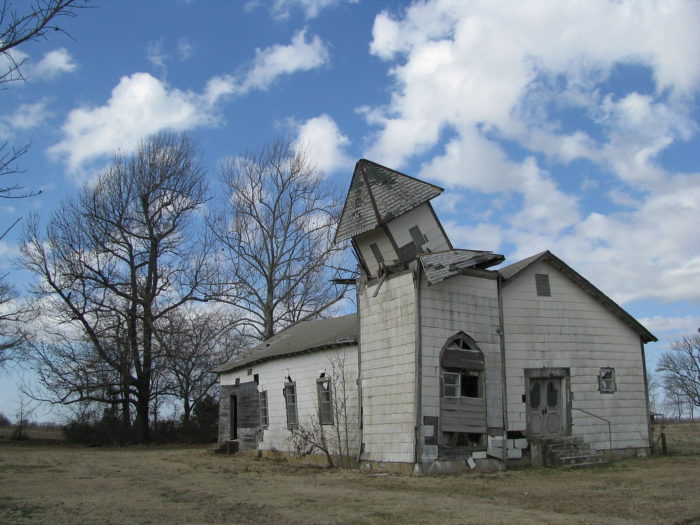How Would the American Church Handle an EMP?
It’s obvious that the modern church, particularly in the USA, is very high-tech. Podcasts, streaming sermons, tithing kiosks, apps, etc., are everywhere. Whether this is good or bad is neither here nor there as far as this article is concerned. I’d like to look at something a little more sensational: what if it all suddenly disappeared?
 Every movie or TV program that utilizes an EMP always has a layman’s explanation of what an EMP actually is, and that gets pretty tedious after a while (same thing with faster-than-light space travel). So if you don’t know what an EMP is, you’re out of luck, because I refuse to continue this pandering trend. I am going to assume that since you’re on this website dedicated to all things spekky, Trekky, and fantastekky (cough), I’ll also assume that you’ve watched at least one movie or TV show where an EMP is explained, and we’ll proceed accordingly.
Every movie or TV program that utilizes an EMP always has a layman’s explanation of what an EMP actually is, and that gets pretty tedious after a while (same thing with faster-than-light space travel). So if you don’t know what an EMP is, you’re out of luck, because I refuse to continue this pandering trend. I am going to assume that since you’re on this website dedicated to all things spekky, Trekky, and fantastekky (cough), I’ll also assume that you’ve watched at least one movie or TV show where an EMP is explained, and we’ll proceed accordingly.
There are many places in the world where the Christian church is very low-tech, due to the fact that the country may not be technologically advanced and/or the church is persecuted and utilizing technology can actually pose a danger. Bibles are printed on paper, sermons are delivered only to those in attendance, and preachers travel from church to church by bicycle or on foot. In places like this, the biggest disruption following an EMP burst would be in communications between believers and churches, but the reading of the Word and church services, perhaps already underground, would continue as normal.
In America, however, technology permeates every aspect of our daily lives, and the church has adapted. Millions of Americans get their Sunday “Jesus jolt” via television or podcasts, sometimes totally foregoing fellowship with other believers. A sizable number of Christians, myself included, primarily reads the Bible on their phones. Many of my friends listen to several Christian podcasts a week, and YouTube has a wealth of videos pertaining to evangelism, theology, counseling, and numerous church-centric topics.
It would be hard to imagine a world where this was no longer accessible (I don’t know how our grandparents survived). But what would impact be on the tech-heavy American church?
For one thing, church attendance would drop drastically. The church I attend is a twenty minute drive from my house, and modern cars are essentially computers on wheels. Unless someone has an old Datsun pickup truck in a garage somewhere, our mobility will drop to near zero following an EMP. And since phones and computers wouldn’t work anymore either, we would lose touch with other members of the congregation who likely live more than walking distance away. In spite of this upheaval, I would hope that true believers would seek each other out in neighborhoods and apartment complexes, and new home churches would bloom.
Most Christian homes have printed Bibles, so the loss of Bible apps wouldn’t have a large impact. What would change, however, is prevalence of so-called “Christian celebrities.” Not just televangelists, but Christians in a number of ministries who make their living and reach their audiences through the internet. A lot of casual Christians would likely forsake the faith because they have more pressing matters at hand, or so it may seem. Without the ease of Christian podcasts or streaming videos, the faith would become to burdensome, and we would truly see a separation of the sheep from the goats.
Organized church ministries would suffer, since these depend on logistics and automation and administration, but churches with abundant resources, such as food pantries, large facilities, or land would be in an excellent position to reach out to the immediate community and provide for daily needs. Of course, the primary mission of the church is to spread the Gospel, but the Bible repeatedly admonishes churches to provide for physical needs as a way of displaying the love that God has shown to us. Even small churches with comparatively little resources could become focal points of communities reeling with fear and uncertainty, and it is in our most helpless moments that we see how dependable God’s promises have always been.
One positive aspect would be that the church would grow. Scriptures and history shows us that the church always flourishes under hardship and persecution. I do not wish for such circumstances to visit upon us, but I have no doubt that my heart and my soul would be thrilled to see the work that God would do in spite of apocalyptic events. God will grow His church, no matter the soil in which it is planted.






































I think I would be more distressed by air conditioning going away from the church in Texas I attend than electronic gadgets… (HOW DID PEOPLE LIVE HERE WITHOUT AC?)
What about us in the north country (Canada). How did we live without HEAT!
Living without a heater would probably be easier than living with out an air conditioner, at least assuming one has a fireplace.
Haah! True!
Yep. Wood burning stoves can take care of winter.
Hardships or a crisis always seems to draw us closer to God. How strange! Perhaps there’s a purpose for our chaotic struggles in life then? 🙂
I’m like Travis Perry – I would miss air conditioning since I live in the southern part of the USA. But I would like to think that in the event of an EMP, people would once again connect in person rather than in social media. If I want to visit with a family member or friend, I pick up the phone and call if I can’t go visit in person for whatever reason.
This is the main reason I’m not on Facebook – I like the personal interaction.
If we got attacked by an EMP, we’d probably be too busy trying to survive (possibly competing with our neighbors in order to do so). Or, we would be too busy fighting whoever set the EMP on us in the first place.
William R. Forstchen’s One Second After trilogy paints a realistic picture of an EMP aftermath. I don’t recall how much religion played into the story, but a very good read on a subject people need to pay attention to.
Adding to DD’s comment about novels: there have been a number of books on EMPs/solar eruptions that I can think of. A number of Christian authors have thought about this. Here’s a partial list of which I’m aware (again, Christian authors only):
Larry Burkett – Solar Flare (Yeah, the finances guy)
Terri Blackstock – Restoration series (4)
Last Light;
Night Light;
True Light;
Dawn’s Light
(Blackstock being Blackstock, there’s a mystery of course)
Jolina Petersheim – The Alliance (Christy finalist 2 years ago)
The Divide (followup novel)
Vanetta Chapman – Remnant series
Deep Shadow;
Raging Storm;
Light of Dawn
Petersheim & Chapman brought out their first novels the same year.
There’s at least one more, came out between (?) Burkett & Blackstock; had a questionable religious leader becoming a *big* deal politically after the disaster.
It’s not completely analogous, because our cars still worked, but after Hurricane Charley when there was no power at the church property, we met anyway. We worshipped in the Fellowship Hall because its windows could be opened, unlike the stained-glass ones in the sanctuary. That allowed for more light and a cross-breeze. August in Florida is not for the weak! I suppose if we didn’t have cars the makeup of the local congregations would shift from forming along denominational lines to grouping by neighborhood.